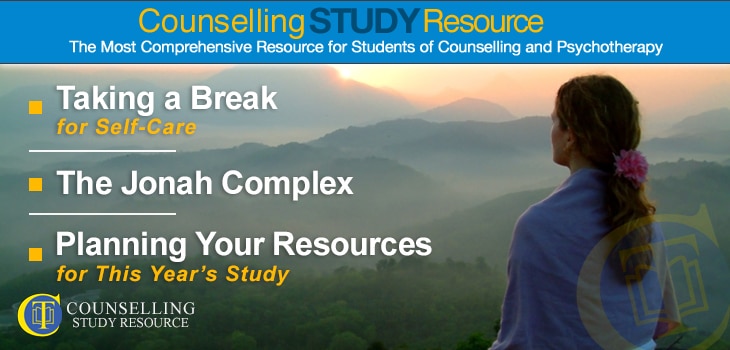049 – Taking a Break for Self-Care – The Jonah Complex – Planning Your Resources for This Year’s Study
In episode 49 of the Counselling Tutor Podcast – the first in Season 3, as the UK academic year starts again – Rory Lees-Oakes and Ken Kelly discuss how important it is to take a break. ‘Theory with Rory’ describes the Jonah complex, followed by some tips from the presenters on planning for the study year ahead.
Taking a Break for Self-Care (starts at 2.11 mins)
The BACP Ethical Framework contains a section on self-care (BACP, 2015: 13):
Care of Self as a Practitioner
We will take responsibility for our own well-being as essential to sustaining good practice by:
- taking precautions to protect our own physical safety
- monitoring our own psychological and physical health
- seeking professional support and services as the need arises
- keeping a healthy balance between our work and other aspects of life
Supervision is vital to good self-care (giving us the chance, for example, to discuss any parallel process and transference), and personal therapy can help us become more self-aware. Taking a break (doing something different) is really important too, helping us to:
- prevent burnout
- avoid letting our work define and overwhelm us
- extend our careers in counselling and psychotherapy
- remain empathic and so build good therapeutic relationships
The Jonah Complex (starts at 10.51 mins)
The Jonah complex is a human trait that was first described by American psychologist Abraham Maslow. Maslow was a member of the Human Potential Movement (HPM), a collaboration of likeminded psychotherapists and philosophers – also including Carl Rogers, Fritz Perls and Eric Berne – who were interested in human potential from a phenomenological viewpoint.
Maslow outlined the concept of the Jonah trait – based on his own observations – in his book The Farther Reaches of Human Nature (Penguin, 1976). It draws its name from the parable of ‘Jonah and the Whale’, which appears in the Bible, Quran and Torah. In this, Jonah tries to escape from God by hiding inside a whale – the message being that you cannot hide from your destiny.
Maslow applied this to human life by explaining that we each have our own barriers and defences that stop us from becoming the best we can be. In their book Person-Centred Therapy Today (Sage, 2000), Dave Mearns and Brian Thorne also describe ‘FOI’ – feelings of incompetence. We often defeat ourselves by doubting our own ability; this has also been described – by Pauline Clance and Suzanne Imes – as the ‘imposter syndrome’, feeling like we are about to be ‘found out’ for not being good enough.
Rory ends by reminding us of Carl Rogers’ view that what matters is to be our real selves. After all, it is the relationship we build with our clients that really makes the difference. You can read more about the Jonah complex in Rory’s handout.
Free Handout Download
The Jonah Complex
Planning Your Resources for This Year’s Study (starts at 18.20 mins)
When studying, it is always wise to plan well ahead for what resources you might need. This can help you avoid the stress and inefficiency of last-minute rushes to find what you need with assignment deadlines looking. Rory shares a pertinent motto: poor preplanning equals piddly poor performance’!
While the internet contains lots of resources, you need to take care as not all of these are trustworthy authority sources. For example, anyone can add information to Wikipedia. It is important that your assignments are well referenced, and contain accurate information.
As an additional service to the Counselling Study Resource, a new Digital Handout Vault (DHV) is soon to be launched. This will include user-friendly summaries and explanations of important counselling-related topics, and you will be able to access everything there through a yearly membership.
Rory and Ken also discuss buying books. It can be tempting to buy old editions of books, since these are often cheaper than the latest edition. This can be fine when they are about theory, but it is not recommended when it comes to practice-based literature. For example, books on ethics and law quickly become outdated; basing your assignments on old books could mean you inadvertently make a mistake.
As it can be hard to know which books to buy and read, Rory has put together a recommended reading list, which will be continually updated. This too will be available in the DHV.
